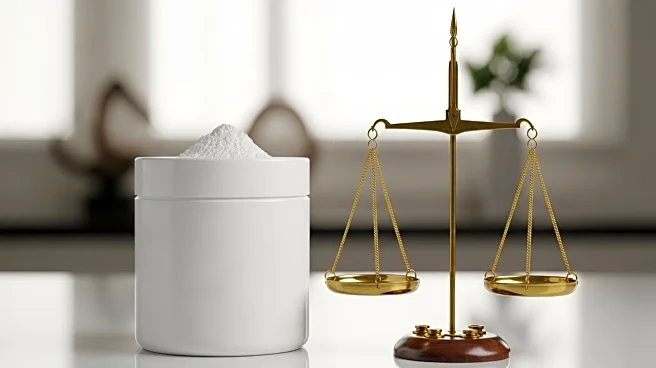What's Happening?
A Los Angeles jury has ordered Johnson & Johnson to pay $966 million to the family of Mae Moore, a California resident who died from mesothelioma in 2021. The lawsuit claimed that J&J's talc baby powder products contained asbestos fibers, which led to Moore's cancer. The jury awarded $16 million in compensatory damages and $950 million in punitive damages. Johnson & Johnson plans to appeal the verdict, arguing that the decision was based on 'junk science.' The company maintains that its products are safe and do not contain asbestos. J&J stopped selling talc-based baby powder in the U.S. in 2020, switching to a cornstarch-based product.
Why It's Important?
This verdict is significant as it highlights ongoing legal challenges faced by Johnson & Johnson regarding its talc products. The company is currently dealing with over 67,000 lawsuits from plaintiffs claiming cancer diagnoses linked to its talc products. The outcome of this case could influence future litigation and settlements. The substantial punitive damages awarded reflect the jury's stance on the severity of the allegations. This case also underscores the broader implications for consumer safety and corporate accountability in the U.S., potentially affecting public trust in major consumer brands.
What's Next?
Johnson & Johnson plans to appeal the verdict, which could lead to a reduction in the punitive damages awarded. The company has previously succeeded in reducing awards on appeal. The ongoing litigation may prompt J&J to consider a nationwide settlement to resolve the numerous lawsuits. The outcome of this appeal and other pending cases could impact the company's financial standing and its approach to product safety and consumer transparency.
Beyond the Headlines
The case raises ethical questions about corporate responsibility and the use of scientific evidence in legal proceedings. The debate over 'junk science' versus credible scientific findings could influence future product liability cases. Additionally, the case may lead to increased regulatory scrutiny of consumer products and their safety standards, potentially prompting legislative changes to protect consumers.









